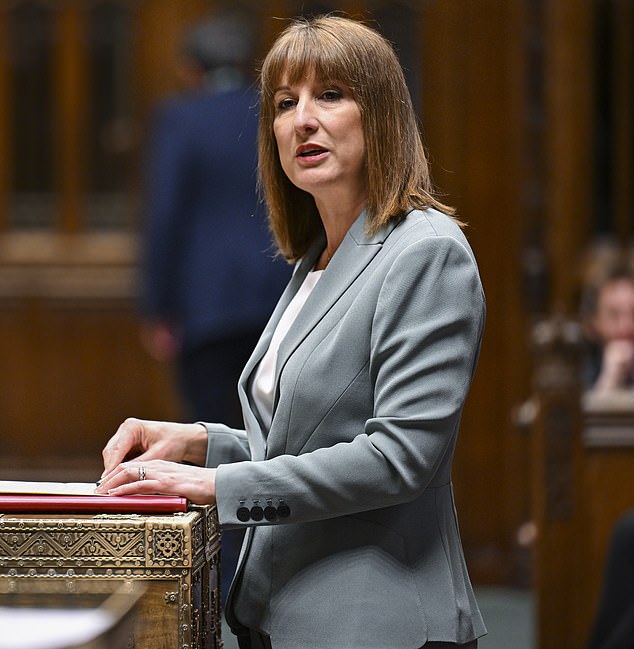Households are braced for more council tax pain after Rachel Reeves signalled maximum rises over the next three years.
As part of the Chancellor’s spending plans, the Treasury suggested that local authorities would hike bills by 4.99 per cent a year for the rest of this Parliament.
This is the maximum hike allowed, in normal circumstances, before councils are required to hold a local referendum.
The 4.99 per cent cap is made up of 2.99 per cent for general spending and a 2 per cent adult social care precept.
Ms Reeves said Labour would not be ‘going above’ the 4.99 per cent cap, but did not deny her spending review – announced yesterday – is based on maximum rises.
‘The previous government increased council tax by 5 per cent a year, and we have stuck to that. We won’t be going above that,’ the Chancellor told ITV.
‘That is the council tax policy that we inherited from the previous government, and that we will be continuing.’
It means the average Band D property faces an extra £395 in council tax in 2028-29 compared to this year, the Liberal Democrats estimated.
Experts warned council tax bills are set to rise at their fastest rate for two decades in the wake of Ms Reeves’ spending review.

Households are braced for more council tax pain after Rachel Reeves signalled maximum rises over the next three years
Paul Johnson, of the Institute for Fiscal Studies, said local government in England did ‘perhaps a little bit better than it might have expected’ out of the Chancellor’s statement on Wednesday.
But he added the ‘sting in the tail’ is the assumption that ‘council tax bills will rise by 5 per cent a year’ as part of the funding.
The core spending power of councils is set to increase by 2.6 per cent a year from next year.
‘If English councils do choose 5 per cent increases – and most almost certainly will – council tax bills look set to rise at their fastest rate over any parliament since 2001 to 2005’, Mr Johnson said on Thursday.
The Chancellor’s spending review was also shown to assume a £14 rise each year in the police precept, the part of the police budget that comes from council tax.
Kevin Hollinrake, the Tory communities spokesman, said households faced a tax ‘double-whammy’.
He warned hikes in council tax bills would also likely be accompanied by further levy rises in Ms Reeves’ next budget, as she looks to fund her spending plans.
Mr Hollinrake said: ‘Rachel Reeves claimed council tax wouldn’t have to go up to afford her spending spree, but this tax bombshell shows that you can’t trust a word she says.
‘Because of Labour’s profligate spending plans today, tax and borrowing increases in the autumn are now inevitable.
‘This tax double-whammy is just rubbing salt in the wounds, and means hundreds of pounds less in take-home pay for hard-working people.’
Liberal Democrat MP Lisa Smart, the party’s home affairs spokesperson, said: ‘The Government is relying on a hidden council tax bombshell to fund their half-hearted rise in police funding as they pass the buck to local families.
‘After frontline policing was neglected for years under the Conservatives, local communities deserve better than this sleight of hand.
‘The Government must put more bobbies on the beat, with the proper funding to make it happen.
‘Liberal Democrats will keep pushing for the proper neighbourhood policing our communities deserve.’
Despite the increases in council tax, local government representatives said there would still not be enough cash to fund services and warned of further cuts.
Tim Oliver, chairman of the County Councils Network, said: ‘This spending review will not be a silver bullet for councils’ financial challenges, and much of the increase in ‘core spending power’ is derived from the assumption that local authorities will levy maximum 5 per cent council tax rises each year.
‘Even accounting for these, the sums today fall well short of filling the projected £2.2billion funding gap faced by county and unitary councils next year and consequently further service cuts will be hard to avoid.’












